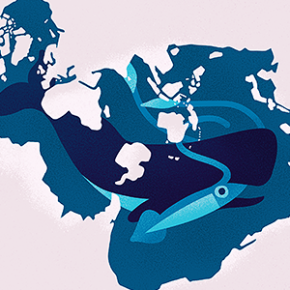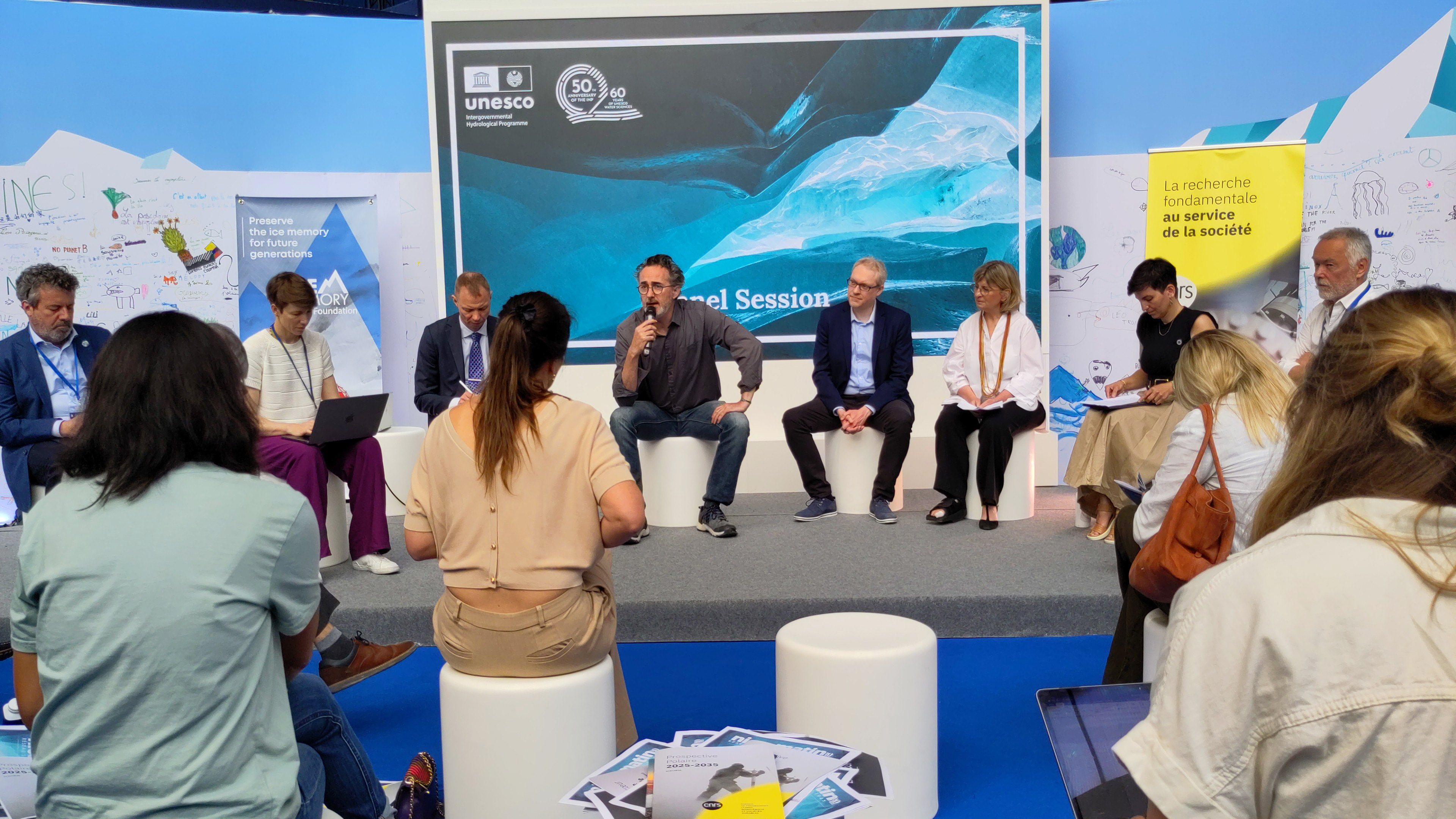The Year of the Ocean: Science in action with the CNRS
As part of the 2025 Year of the Ocean, the CNRS is presenting a series of articles exploring the oceanic challenges at the core of geopolitical debate.

UNOC-3 has put the ocean at the centre of international discussions. Science has gained in visibility but political action remains to be taken. Here's a look back at the results from the scientific side
As part of the 2025 Year of the Ocean, the CNRS is presenting a series of articles exploring the oceanic challenges at the core of geopolitical debate.
From June 9th to 13th 2025, Nice hosted the Third United Nations Conference on the Oceans (UNOC-3), a keenly awaited event that has attracted much comment. ''UNOC is not a Conference of the Parties (COP)", explains Jean-Pierre Gattuso, an oceanographer with the CNRS. "Its objective isn't to negotiate a treaty but instead to evaluate the progress made on Sustainable Development Goal 14 (SDG 14) dedicated to the ocean and its resources". So, did UNOC-3 live up to scientific expectations?
UNOC highlighted the importance of bringing science and policy closer to enhance ocean governance. The principle of 'science-based decision-making' was evident in the speeches and in the event's organisation, taking place as it did shortly after the One Ocean Science Congress (OOSC) jointly organised by the CNRS and the Ifremer. "This conference was a success that was recognised by the States and hailed by the UN. It could serve as a model for the 2028 event to be hosted by Chile and South Korea", adds Jean-Pierre Gattuso.
From 3 to 6 June 2025, more than 2,000 scientists from around the world gathered in Nice for the One Ocean Science Congress (OOSC). Just days before the United Nations Ocean Summit (UNOC-3), the scientific community sounded the alarm: the ocean is in crisis, and time is running out.
The BBNJ Treaty - a promising framework requiring careful guidance
Certain recommendations from the OOSC have fed into the 'Nice commitments for the ocean' published by the French government. The upcoming ratification of the High Seas Treaty (BBNJ) is one of the most important as it aims provide the right framework for the creation of marine protected areas on the high seas, impact assessments, sharing the benefits of marine genetic resources and technology transfer. Only the States that ratify the Convention will take part in the future COPs and thus be part of the operational decision-making process. "The fact that the first BBNJ COP can take place in 2026 is a true success that is due in large part to the mobilisation within the framework of UNOC", points out Joachim Claudet, the CNRS's Ocean Advisor.
This is good news for our planet which could eventually be confronted with the limitations linked to the pre-existing UN landscape. The BBNJ does not question the bodies that regulate fishing (the United Nations Food and Agriculture Organisation) or mining (the International Seabed Authority or ISA), both activities that impact biodiversity in the high seas. Joachim Claudet explains that "the BBNJ will not legally limit these activities but we can hope governments will use some common sense and not defend biodiversity in one UN forum and support mining in another".
Marine protected areas - between rhetoric and real protection
Spectacular announcements were made on marine protected areas (MPAs) but could be said to be more symbolic than substantial. The creation of a giant marine area in French Polynesia is a good example. Joachim Claudet considers it "remarkable that a strict protection zone covering over 900,000 km² has been set up but in fact the entire exclusive economic zone of French Polynesia of around 5 million km² will be classified as an MPA. 78% of the French exclusive economic zone (EEZ) is now classified as an MPA. However, the challenge for France is not to create more MPAs1 - we need to protect the ones we already have better. And currently destructive fishing activities are still going on in MPAs even though the European Commission is calling for strict protection of a third of these".
Comment le CNRS diffuse le savoir scientifique auprès du grand public ? Comment sensibiliser aux grands enjeux liés à l’océan, mais aussi comment dialoguer avec les pouvoirs publics et acteurs économiques pour gérer au mieux les ressources marines et les territoires proches des littoraux.
The official launch of the IPOS at UNOC-3
UNOC-3 also saw the formalisation of several collaborative tools involving the research sphere, with the most symbolic being the International Platform for Ocean Sustainability (IPOS). The CNRS has supported this initiative from the outset and it is now mentioned in the United Nations' official recommendations. "It's a total success", says Françoise Gaill, the vice-president of IPOS who has led the project for two years.
IPOS was designed to be international in nature and indeed involves 60 scientific institutions and international organisations. Its objective is to rapidly produce on-demand summaries and decision-making tools for governments and non-governmental stakeholders. An initial report on deep-sea exploitation was presented in April at the SOS Ocean event. A beta version of an artificial intelligence tool called 'Ocean-GPT' is currently in development. It is designed to aggregate data from academic research, indigenous knowledge and citizen contributions.
Françoise Gaill explains that "the official launch of IPOS has already attracted several governments with concerns about marine protected areas or the marine economy in southern countries. However, funds still need to be raised to ensure the sustainability of IPOS before requests can be responded to".
Observing the ocean - efforts are still required
Ocean observation (the collection, qualification and availability of marine and oceanic data) had a leading role to play in the discussions and commitments announced at national and European levels (with the European Union's Ocean Pact). This is a tremendous success for the OOSC and UNOC-3 because to protect the ocean effectively we need to know as much as possible about it - a long-standing CNRS position.
This work on ocean observation mainly involves observations at sea but UNOC-3 also gave a boost to space research with the Space4Ocean alliance expanding during the conference. This alliance aims to coordinate space observation of the oceans more effectively. "It's really important but space observation is not enough on its own - we need to set up a real dialogue involving in situ observations and modelling. The CNRS is active in these two areas and has a central role to play as a signatory of the alliance", stresses Joachim Claudet.

Another initiative showcased in Nice was the transformation of Mercator Ocean International into an intergovernmental organisation. This is intended to ensure the Digital Ocean Twin to be created by the Mercator consortium, which the CNRS is part of, becomes a critical and effective tool for the protection of the world's ocean space.
Finally, we may cite the launch of the Neptune Mission led by the CNRS and the Ifremer with European Commission support which provoked much curiosity among attendees. Jean-Pierre Gattuso points out that "we're asking that everything that is done should be in addition to, and not instead of, existing efforts and funding".
Science in peril in the North and the South alike
Ironically, although science is making progress in diplomatic circles, it is also under threat elsewhere, with the United States proving a case in point. Several key ocean-observing agencies like NASA, NOAA or the Environmental Protection Agency (EPA) are suffering massive budget cuts that are making international ocean research look like collateral damage.
A study co-authored by Jean-Pierre Gattuso and published at the end of May found that the United States funds 51% of the ARGO in situ ocean observation floats. To complicate matters further, only 24 of the 154 countries with coastlines actually contribute to the programme. "This is like a stress test for global observation", warns Mr Gattuso. "The whole warning, modelling and action system will falter without European and Asian relays and, for the time being, the commitments of the States to keep this network alive are still pretty timid".
UNOC-3 finally did give science unprecedented visibility for five days but also clearly showed that science now needs to find new sources of support as the time when governments could support research alone is over. Given the challenges facing our oceans, civil society as a whole needs to get involved, even if this means developing new partnerships that involve the private sector, foundations, NGOs and major sponsors. It is now up to the diplomatic community to turn this forward momentum into tangible decisions rather than waiting for UNOC-4 in 2028 to actually take action.
There can be no sustainability without equity and Joachim Claudet hammered home this message at a side event organised by the CNRS even though the principle is still having difficulty gaining the required support in international negotiations. "The blue economy remains profoundly unequal", points out Mr Claudet. This is illustrated by the issue of patents on marine genetic resources, with 48% of these held by a single company, the chemical giant BASF.
Faced with this concentration of patents, a number of initiatives are calling for more inclusive governance. The idea is to involve NGOs, local communities and civil society in the decision-making process. This is still an emerging dynamic but it is crucial if sustainability is to be the fruit of a collective and inclusive approach rather than just a watchword.